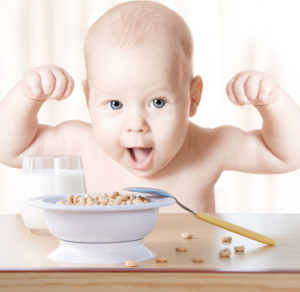 There’s a lot of information out there about how and when to start feeding your baby real food! This should be an exciting time with (hopefully!) minimal stress for you. Here are some basic tips to start your baby on solid foods:
There’s a lot of information out there about how and when to start feeding your baby real food! This should be an exciting time with (hopefully!) minimal stress for you. Here are some basic tips to start your baby on solid foods:
What are considered solid foods
For babies, this means anything other than breast milk or formula. Solids include pureed fruits and vegetables, baby cereal, table foods, etc.
When to start your baby on solid foods
Look for basic cues that your baby is developmentally ready, such as your baby watches you eat and is interested in what you are eating. He may reach for your food or open his mouth when food comes his way. He can sit up on his own and hold his head up steadily. For most babies, solids are introduced at around 6 months of age. Introducing solids too early may increase the risk of food allergies.
As solids readiness depends on both the maturity of baby’s digestive tract and baby’s developmental readiness for solids, talk to your pediatrician about when is the best timing for your infant.
What solids to start with
Recommendations have changed over the years. Breast fed infants need vitamin C sources and iron sources as their first foods. Experts now recommend starting with any of the following: iron-fortified rice cereal or baby oatmeal mixed with breastmilk or formula, or pureed vegetable, fruit, or meat.
Do not add salt or sugar to baby’s food, even if it tastes bland to you (baby’s kidneys can’t handle extra salt right now).
Wait an average of five days between introducing new foods. If your baby has a reaction to a new food (rash, hives, loose watery stool), then you can more easily pinpoint which food caused the problem.
What size solids to feed
When your baby can sit up well and bring his hands to his mouth, you can start with finger foods. Good suggestions include foods that your baby can squeeze between his pointer finger and thumb. These are small pieces of cut-up sweet potato, banana, avocado, cooked carrots, peas, scrambled eggs, or well-cooked pasta.
You can also give your baby some of these foods mashed onto a rice cake that he can hold. Some people prefer giving more textured foods at an earlier age and avoid purees on a spoon entirely (this is known as Baby-Led Weaning).
At this early stage of introducing new foods, babies should not have to chew food. They just mash it with their gums.
Avoid giving hot dogs or tough meats that require chewing.
Avoid giving hard, raw fruits or vegetables (other than soft ones like banana or avocado) until baby has teeth and is able to chew and swallow well.
Introducing Allergenic Foods
It is NOT recommended giving honey to a child under one year of age. Honey can contain botulism spores, which can make infants very sick.
High-risk allergenic foods (such as wheat, egg whites, fish, and peanut butter) can be safely introduced after 6 months of age, as long as your baby is tolerating a few other solids like fruits and vegetables. (If you want to give peanut butter, wait until around 10 months of age and give a very thin spread of smooth peanut butter on toast).
Signs of food allergy may occur a few minutes or hours after his first bite, but your child may not react until he has had the food a few times.
Note: If either parent has food allergies, you should check with your pediatrician to see if they recommend waiting to introduce these foods to your baby.
Introducing food is a very exciting time for you and your baby! Remember, when you start your baby on solid foods it is important to offer a variety of foods so that your baby gets to experience different tastes at an early age. Take your time, be patient and most of all, have fun!
If you have any concerns or would like assistance developing a feeding schedule or food plan, give us a call at (781) 608-8397.
